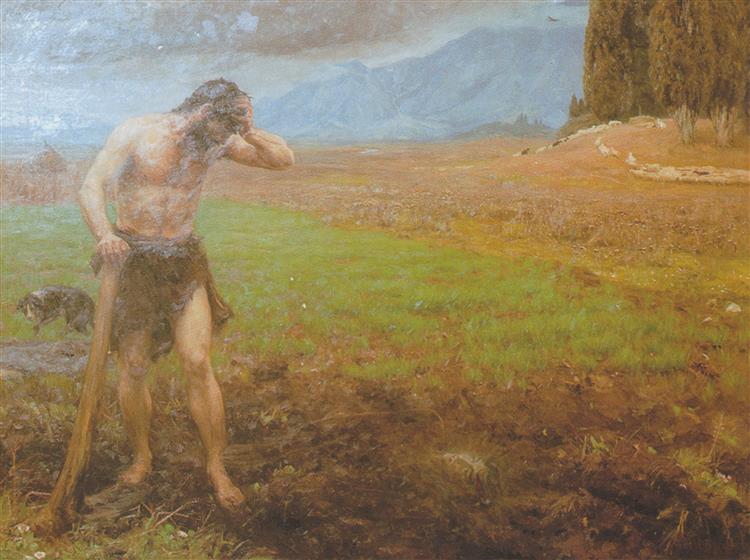Description
The work "Kain Ved Sit Arbejde I Marken Efter at has Ihjelslået Sin Broder Abel" by Hans Andersen Brendekilde, painted in 1896, evokes an intense visual narrative that, from its essence, is inserted in the field of symbolism and the Danish nationalism of the end of the nineteenth century. This painting not only captures a decisive moment within the biblical account of Cain and Abel, but also reveals the emotional and existential complexities inherent to the human condition, often portrayed in the artist's work.
In the work, Cain presents himself in the act of working the earth, a symbol of his sentence and the burden he has after the death of his brother. His position is tense and reflective, showing a tormented being that cannot escape the consequences of his violent act. The natural context that surrounds him a vast field, illuminated by a dim and melancholic light suggests both the life cycle linked to agriculture and the weight of repentance and guilt. The palette used by Brendekilde is predominantly terrious, with tones of brown, green and ocher that underline Cain's connection with the earth and its work, but at the same time they evoke an atmosphere of desolation and severity.
The details of the landscape are significant; The vegetation is abundant, but is presented with a subtlety that suggests the withered potential of life under the shadow of crime. The use of light and shadow in the composition helps to emphasize the internal conflict of Cain, who is caught between the duty of working the earth and the echoes of his violent act. Brendekilde, known for his ability to capture natural light, uses this element to create an atmosphere that resonates with the anguish of the character; The soft nuances of light fall on Cain, alluding, perhaps, to a faint hope in the midst of their misfortune.
The figure of Cain is the only one represented in the work, which focuses all the attention on its internal struggle. This is characteristic of Brendekilde's style, who frequently explores loneliness and introspection in his characters. Abel's absence in painting is not an oversight; On the contrary, his absence highlights even more the fault and the load that Cain carries behind him, which intensifies the drama of the scene.
The work is inserted in an artistic tradition in which the biblical themes are reinterpreted through the lens of the human condition. Brendekilde aligns with other artists of his time that sought to give a more introspective and emotional sense to mythical and religious figures. In these representations, the artist not only stops in the explicit narrative, but invites the viewer to reflect on morality, difficult decisions and the nature of repentance.
In conclusion, "Kain Ved Sit Arbejde I Marken EFTER AT HAVJELSLået Sin Broder Abel" is a clear example of Hans Andersen Brendekilde's ability to address deep topics through his master in the use of color, light and shape. The work is not only limited to telling a biblical story; It is a reflection on the guilt and redemption that resonates in the viewer, a testimony of the artist's talent to translate the complexity of the human soul into a visual landscape that, while it is bleak, suggests a light of hope in the impact of the impact of the gold that emanates from the struggle for life.
KUADROS ©, a famous paint on your wall.
Hand-made oil painting reproductions, with the quality of professional artists and the distinctive seal of KUADROS ©.
Art reproduction service with satisfaction guarantee. If you are not completely satisfied with the replica of your painting, we refund your money 100%.

